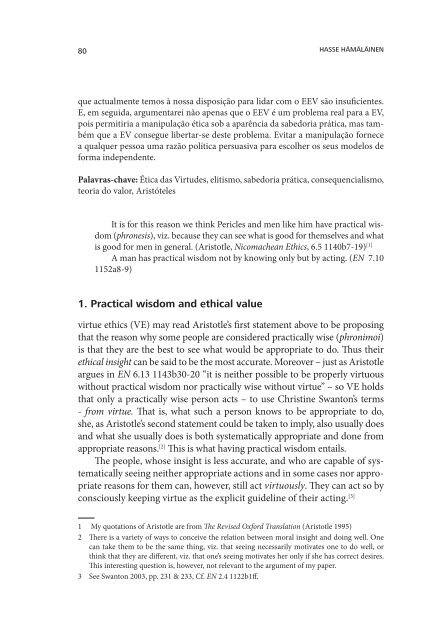Diacritica 25-2_Filosofia.indb - cehum - Universidade do Minho
Diacritica 25-2_Filosofia.indb - cehum - Universidade do Minho
Diacritica 25-2_Filosofia.indb - cehum - Universidade do Minho
Create successful ePaper yourself
Turn your PDF publications into a flip-book with our unique Google optimized e-Paper software.
80<br />
HASSE HÄMÄLÄINEN<br />
que actualmente temos à nossa disposição para lidar com o EEV são insufi cientes.<br />
E, em seguida, argumentarei não apenas que o EEV é um problema real para a EV,<br />
pois permitiria a manipulação ética sob a aparência da sabe<strong>do</strong>ria prática, mas também<br />
que a EV consegue libertar-se deste problema. Evitar a manipulação fornece<br />
a qualquer pessoa uma razão política persuasiva para escolher os seus modelos de<br />
forma independente.<br />
Palavras-chave: Ética das Virtudes, elitismo, sabe<strong>do</strong>ria prática, consequencialismo,<br />
teoria <strong>do</strong> valor, Aristóteles<br />
It is for this reason we think Pericles and men like him have practical wis<strong>do</strong>m<br />
(phronesis), viz. because they can see what is good for themselves and what<br />
is good for men in general. (Aristotle, Nicomachean Ethics, 6.5 1140b7-19) [1]<br />
A man has practical wis<strong>do</strong>m not by knowing only but by acting. (EN 7.10<br />
1152a8-9)<br />
1. Practical wis<strong>do</strong>m and ethical value<br />
virtue ethics (VE) may read Aristotle’s fi rst statement above to be proposing<br />
that the reason why some people are considered practically wise (phronimoi)<br />
is that they are the best to see what would be appropriate to <strong>do</strong>. Th us their<br />
ethical insight can be said to be the most accurate. Moreover – just as Aristotle<br />
argues in EN 6.13 1143b30-20 “it is neither possible to be properly virtuous<br />
without practical wis<strong>do</strong>m nor practically wise without virtue” – so VE holds<br />
that only a practically wise person acts – to use Christine Swanton’s terms<br />
- from virtue. Th at is, what such a person knows to be appropriate to <strong>do</strong>,<br />
she, as Aristotle’s second statement could be taken to imply, also usually <strong>do</strong>es<br />
and what she usually <strong>do</strong>es is both systematically appropriate and <strong>do</strong>ne from<br />
appropriate reasons. [2] Th is is what having practical wis<strong>do</strong>m entails.<br />
Th e people, whose insight is less accurate, and who are capable of systematically<br />
seeing neither appropriate actions and in some cases nor appropriate<br />
reasons for them can, however, still act virtuously. Th ey can act so by<br />
consciously keeping virtue as the explicit guideline of their acting. [3]<br />
1 My quotations of Aristotle are from Th e Revised Oxford Translation (Aristotle 1995)<br />
2 Th ere is a variety of ways to conceive the relation between moral insight and <strong>do</strong>ing well. One<br />
can take them to be the same thing, viz. that seeing necessarily motivates one to <strong>do</strong> well, or<br />
think that they are diff erent, viz. that one’s seeing motivates her only if she has correct desires.<br />
Th is interesting question is, however, not relevant to the argument of my paper.<br />
3 See Swanton 2003, pp. 231 & 233, Cf. EN 2.4 1122b1ff .<br />
<strong>Diacritica</strong> <strong>25</strong>-2_<strong>Filosofia</strong>.<strong>indb</strong> 80 05-01-2012 09:38:22











![Programa [pdf] - cehum - Universidade do Minho](https://img.yumpu.com/17305425/1/190x135/programa-pdf-cehum-universidade-do-minho.jpg?quality=85)




